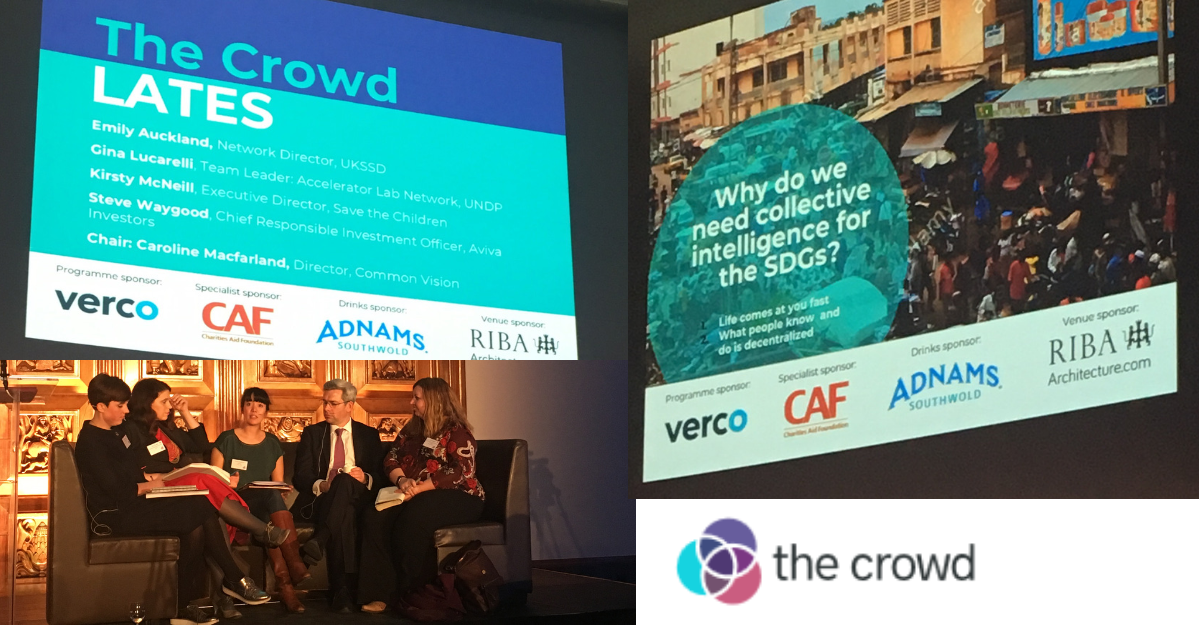BIP.Verco Sponsored event: Harnessing collective intelligence to accelerate the Sustainable Development Goals

BIP.Verco were proud to be the programme sponsor for the first event of 2019 hosted by The Crowd on “Harnessing collective intelligence to accelerate the Sustainable Development Goals”. The event was hosted by the RIBA in London and had a fantastic line up of speakers, from finance to the charity sector. Geoff Mulgan from Nesta and author of the book ‘Big Mind’ started the presentations by asking what resources of intelligence could be used to allow a city to function as if it were a human brain. Steve Waygood from Aviva voiced his concerns of how business externalities are not incorporated into investment decisions fundamentally ignoring the one planet boundary, and the vital need for more clarity into how our money is being invested. Sam Baker, Partner at Monitor Deloitte, warned of the myopia of middle management as one of the biggest challenges to achieving the SDG’s, and also the essential role of collective intelligence in reporting to ensure that annual improvements are demonstrated, and the impact on stakeholders that we are trying to engage with is measured and fully understood. Linked to this, in the absence of a global regulator to hold companies to account for their commitment to the SDG’s, the World Benchmarking Alliance, which was launched last September, aims to provide an essential tool for measuring and comparing corporate performance on working towards the SDG’s.
The panel discussion, which will also be available as a podcast, had both inspiring and sobering commentary from Save the Children’s Kirtsy McNeil, who voiced the impact of government choices, specifically with reference to engaging in conflict, in impeding progress to achieve the SDG’s. She also championed the voice of the public with a rallying cry to convince people that they have the agency to make a change, and demand more data and information to make informed decisions. The UK Stakeholders for Sustainability’s Network Director Emily Auckland voiced the need to actually apply collective intelligence in practice, highlighting how the UK has good data and statistics but that these need to be used effectively within the wider policy context. She also voiced her concerns with major distractions, namely Brexit, to achieving the SDG’s in the UK.
Focusing on the methods to utilise the vast pools of data available to us, Gina Lucarelli from the UN, who also gave a rousing presentation to the audience earlier in the evening, warned against blindly relying on artificial intelligence in the absence of human analysis because machine learning can reinforce error, concluding that machines have bias just like humans. She highlighted the need to link knowledge from machine learning and data with the systems thinkers to adapt the SDG’s to the needs of local people.
In addition to this, the round tables were engaging forums for attendees to discuss and share views and experience. BIP.Verco chaired a round table focusing on “Collective climate action for a zero carbon future” with participants sharing their thoughts on the current challenges and opportunies in the journey to a zero-carbon economy. Earlier in the evening, Gina Lucarelli had described the need to consider technology, human interaction and whole systems thinking in parallel and this concept was further explored in the roundtable. The general conclusion was that technological progress has been very encouraging but the human side is lagging behind with greater clarity required from policymakers and improvement needed in consumer knowledge which would be helped by opening up private databases. Reasons for optimism included the engagement of younger generations in sustainability and circular economy solutions finding synergies between energy, water and waste.
Overall - it's no secret that the scale of the problem the SDG's aim to tackle is immense but the evening had a very positive response; that through collective intelligence, empowerment and a targeted approach we can start to chip away at the challenges preventing us from achieving them.